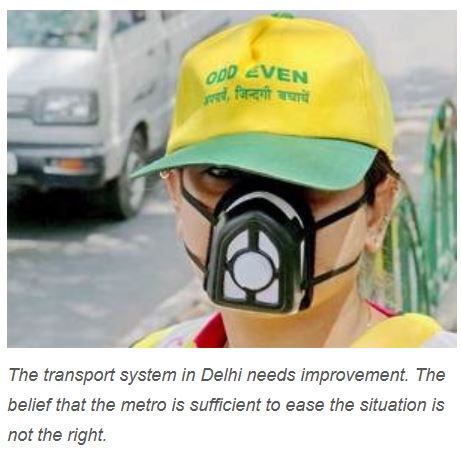[India_Economic Times] Solution beyond odd-even: An integrated transport system is required to curb Delhi air pollution
Solution beyond odd-even: An integrated transport system is required to curb Delhi air pollution
ET CONTRIBUTORS| Nov 12, 2017, 10.07 PM IST

By OP Agarwal
The air we breathe in Delhi has deteriorated to unprecedented levels. Most people say this is the worst they have ever encountered. As I write this, the Air Quality Index in New Delhi is around 470. Health advisories recommend that we suspend our morning walk if the index crosses 400 and that we stay indoors if it crosses 500. So, we are very close to being confined to our homes and not move out. Such is the crisis currently facing Delhi.
A more effective measure may be to increase the cost of vehicle use on a short-term basis. For example, increasing the fuel tax or increasing the parking fee over a few days would have the effect of permitting emergency travel to take place and yet persuading non-emergency travel to be postponed. People would decide on their trips by judging importance vis-à-vis the cost. There are also other emergency measures that can also be taken, perhaps with more significant impact.
Encouraging offices and other agencies to be liberal in allowing people to work from home for a week would have more positive impacts. Persuading schools to close for a few days would not only reduce vehicular trips but also save children for the adverse health impacts. In emergency situations, there is barely any time to think and debate.
Hence, the best decisions are often not made. One is always wiser in hindsight and one must recognise that. Therefore, it is useful to develop and publicise a graded response system that clearly lays down the measures that would be invoked at different levels of emergency. If people are aware of this, they would be prepared for it and face less harassment each time an emergency takes place. Further, once the emergency is over, sustained actions are needed to prevent recurrence.
For this, it is imperative that a reliable study be carried out to determine what is contributing to this problem. This has apparently been done by well-known and reliable organisations like TERI and IIT-Kanpur. Experts must study these reports and agree on a diagnosis of the problem. What are the causes and what causes how much damage are questions that need to be answered as part of the diagnosis. Only this will help identify remedies that tackle the main problems and not the marginal ones. < ..
Integration of different modes of transport is also very important and well recognized all over the world. Unfortunately, this is not the case in Delhi. Mayor of Seoul, Park Won-soon, was in Delhi during these few days of very poor air quality. Measures that Seoul has taken to improve its public transport system to be among the best in the world would be good lessons for us to learn. AA high-quality metro, integrated with a high quality bus system and coupled with an excellent walking environment is what Seoul boasts of. Delhi is the capital of the country that the world is wooed as an investment destination. Should we not invest in a integrated transport system?
(The writer is a transport expert and CEO, World Resources Institute India)
(The writer is a transport expert and CEO, World Resources Institute India)